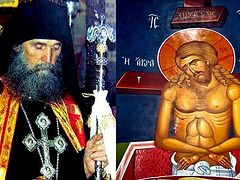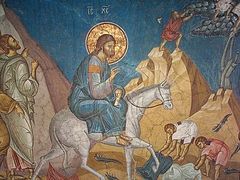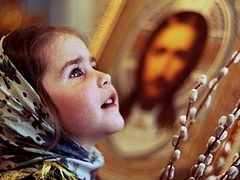All of us Christians are called to enter the coming Kingdom of God and His saints. We have often heard in church and we read in Holy Scripture the expressions, “The Kingdom of God,” “The Kingdom of Heaven,” and “The Kingdom of Christ.” Every Liturgy begins with the exclamation, “Blessed is the Kingdom of the Father, and of the Son, and of the Holy Spirit…” But do we understand, can we imagine what kind of Kingdom this is? Alas, the answer is often disappointing: We have a very poor idea of what the Kingdom of God is. Today’s feast—the Entrance of the Lord into Jerusalem—helps us understand why this happens.
Let us recall the events of this feast: A few days before His Crucifixion, Christ and His disciples solemnly entered the city of Jerusalem through a great crowd of people. Why did He do this? To reveal His Messianic Kingdom. After all, Christ is King, and He came into the world to establish His Kingdom. It is the custom of earthly kings to go to the capital when they enter into their kingdom, where they are solemnly received and welcomed by the people. And Christ does likewise: With everyone rejoicing and crying, “Hosanna,” He enters into His capital—the Divine city of Jerusalem. His people greet and welcome Him with great enthusiasm.
However, a tragic change in the mood of the people occurs in the following days: They reject Christ and hand Him over to Crucifixion. Why? Because Christ didn’t live up to the hopes the people had placed upon Him. The people wanted a political leader, a restorer of the nation who would liberate the Jews from the Roman occupants and give them earthly prosperity. In other words, the people were looking for an ordinary, earthly king—glorious, powerful, and formidable to his enemies. When everyone saw that Christ was not living up to these hopes, that He wasn’t planning to become such a king, then they rejected Him and handed Him over to the Roman authorities for a lawless trial and execution. Thus, this monstrous crime, which has no equal anywhere in history, was committed because the people had false ideas about the Messiah and the Messianic Kingdom.
Alas, it must be said that we often have very vague ideas about just what is the Kingdom of Christ, to which we are called. First of all, we forget that this Kingdom is not of this world. Christ rejected earthly kingdoms—He wasn’t born an emperor; that is, from the beginning, He didn’t want to become an earthly political leader. And later, when many suggested that He choose this path, He unfailingly declined such offers. The devil also advised Him to become a global ruler, but Christ rejected the devil’s temptation, for He came to Earth not to lay the foundations for an earthly kingdom, but the Heavenly, otherworldly Kingdom.
What kind of Kingdom is this? It’s difficult to talk about it because it’s completely unlike any earthly kingdom, state, or empire. This Kingdom is of a completely different image and nature. It is truly not of this world, as Christ Himself said of it. It’s unlike anything on Earth, and nothing in our world can be compared to it. It’s not in vain that the Apostle says: Eye hath not seen, nor ear heard, neither have entered into the heart of man, the things which God hath prepared for them that love Him (1 Cor. 2:9).
The Kingdom of Christ is the mysterious unity of the saints in God. This unity is accomplished by God Himself—by the Holy Spirit. Therefore, the mystery of the Kingdom of Christ can be comprehended only by those who have themselves received the grace of the Holy Spirit. We understand this mystery poorly because there is little grace in us. This mystery was revealed to the saints, in whom dwelt great grace. The Holy Spirit showed them the coming glory of the Kingdom of Christ, and they all bear witness that this glory transcends every mind and every word of man.
But let us return to today’s feast. The meaning is precisely that the Lord enters into His capital, Jerusalem, to found, to reveal His Kingdom. In this, He acts like ordinary earthly kings. The people recognized it and therefore they met Him with great enthusiasm, with palm branches and shouts of “Hosanna.” But then Christ behaves quite differently from earthly kings—He doesn’t sit on the throne of an earthly kingdom, He doesn’t do what the crowd expected of Him, but walks a completely different path—the path not of an earthly, but a Heavenly King. Christ walks the wondrous and incomprehensible path of Divine love—the path of death upon the Cross and Resurrection. He doesn’t accept a political kingdom. He passes it by, rejects it. Thereby, He shows that His Kingdom is not of this world, that it’s completely different. The Apostles and disciples of Christ began to understand what kind of Kingdom this is a few days after Golgotha, when Christ resurrected from the dead. For by His Resurrection, He deposed the chief and supreme ruler of our world—death, which reigns supreme over all the kingdoms and rulers of this world. Over the Kingdom of Christ, however, it has no power, and everyone who enters into His Kingdom receives this freedom so coveted for centuries, unattainable in any earthly state—freedom from death. Therefore, the Resurrection of Christ is truly His ascension, truly the revelation and manifestation of His Kingdom. And from the Gospel we see that the Resurrected Christ was solemnly greeted and worshiped as a King by His disciples, who became the first subjects, the first citizens of His Kingdom—a Kingdom where there is no death, but life without end.
So we are all called to enter into this blessed Kingdom of God, to become His citizens. For here have we no continuing city, but we seek one to come (Heb. 13:14), says the Apostle Paul about Christians, the followers of Christ. We must never forget, brothers and sisters, that our Fatherland is in Heaven, that we are but strangers in this world. If I forget thee, O Jerusalem, let my right hand forget its skill (Ps. 136:5), says the holy Prophet David. For the meaning of our earthly path is to arrive there—to the Heavenly Jerusalem, the entrance to which Christ opened for us by His Cross and Resurrection.
Amen.




